Lauren Daigle on Working With Mike Elizondo, Bringing ‘Kaleidoscope Jesus’ Into Mainstream Pop, and Discovering Her True Voice Coming Into Her 30s
- Oops!Something went wrong.Please try again later.
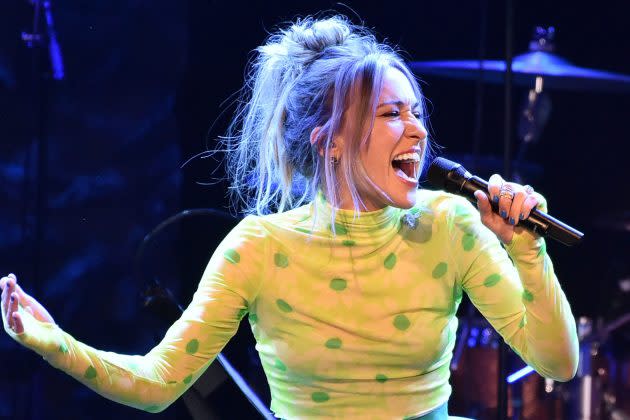
Imagine Adele happy, and you’re at least part of the way toward understanding the appeal of Lauren Daigle, the powerhouse singer whose self-titled third album — and first with Atlantic Records — came out May 12. Of course, making a joyful noise has been something of a mandate for Daigle, who became arguably the biggest star to arise out of the Christian music scene in the last 10-15 years before entering pop crossover territory. But even if peacefulness and positivity weren’t part of the job description up to this point, Daigle is someone who naturally exudes good vibes, in and out of song. As she puts it, quoting her friend Natalie Hemby, Daigle has a “little hippie thing” going on, which she attributes in part to her Louisiana upbringing, that has erupting in perpetual grins to go with her inner groove.
The new “Lauren Daigle” record goes the furthest toward any of her records to date in capturing that. On her previous album, “Look Up Child,” which established a high profile for her in mainstream pop (and made her a staple for guest appearances on shows like “The Voice” and “American Idol,” as well as seemingly every Recording Academy-related all-star event), the drama was heightened to the point that Daigle really did sound like a soaring but downcast Adele, even if the lyrics reflected spiritual angst rather than lost love. The current album has more of that, as heard in the initial single, “Thank God I Do,” a triumph-over-despair power ballad if ever there was one. But, with producer Mike Elizondo (Fiona Apple, Twenty One Pilots, 50 Cent) at the helm, she spends a good portion of the album loosening up, too, with some stylistic variations that go a long way toward establishing her as one of the best singers in contemporary pop.
More from Variety
Beyonce Collaborators, Country Titans: Who Will Be the First-Ever Grammy Songwriter of the Year?
Jon Batiste Funks Up Carnegie Hall With Debut of His Grand 'American Symphony': Concert Review
Variety spoke with her shortly after the self-titled album came out as she celebrated its release with a series of intimate promo concerts. A fall arena tour will more befit her headliner status, with stops including Prudential Center in Newark, NJ on Oct. 20 and L.A.’s Crypto.com Arena on Nov. 10.
There seems to be a big difference between this album and the previous one. The last album felt fairly heavy, in a lot of ways, just in terms of being ballad-heavy and very dramatic. This one has its dramatic moments throughout, to be sure, but there’s also some really vibey stuff that wasn’t as predominant on the last record. Were you wanting to change the balance a little bit?
Well, this is kind of funny. The reality is that I am someone who actually loves life. I love to play pranks. I love to laugh a lot. I don’t like taking myself too seriously, I would say, 80% of the time. I’m probably a lot goofier than what people would ever know from my music. And there was just this feeling that everybody comes to the shows and they get their good cry out, and I’m all about it. But I also want to feel like I can run around on stage and have a party and be just really fun, because that’s just a large portion of who I actually am.
I’m from Louisiana, and we dance all the time — like, the dancing literally never stops. One time we were heading back from an LSU game, and I had my manager with me, because I wanted her to experience Death Valley. If you know anything about Louisiana, there’s swamps and lakes everywhere, so you sit on bridges for hours and hours and hours if there’s ever a wreck. And that’s exactly what happened. We’re on this 19-mile-long bridge and a wreck happened, so we’re sitting there for hours, and everybody gets out of their car, cranks the music, and we all start doing line dances on the bridge, at 2 o’clock in the morning. And she was like, “Oh my gosh, I get it now. I get it.”
So, I do love the human aspect of the ballad. I love connecting to the soul of a human in that very emotional way and giving language for people who may not necessarily know how to express themselves or what to feel in moments of chaos and things like that. But I also want people to really be able to have something to celebrate with. I love celebrating life, and that was really important to show and express on this record.
Just so we have it right, it sounded like you said you wanted your manager to express Death Valley… in Louisiana…
Yeah, Death Valley is the LSU stadium.
OK. Not being football-savvy, I was thinking of our California desert, and not quite squaring that.
I know, there’s a couple of ’em. But we do it better, so don’t let ’em tell you otherwise. I’m kidding.
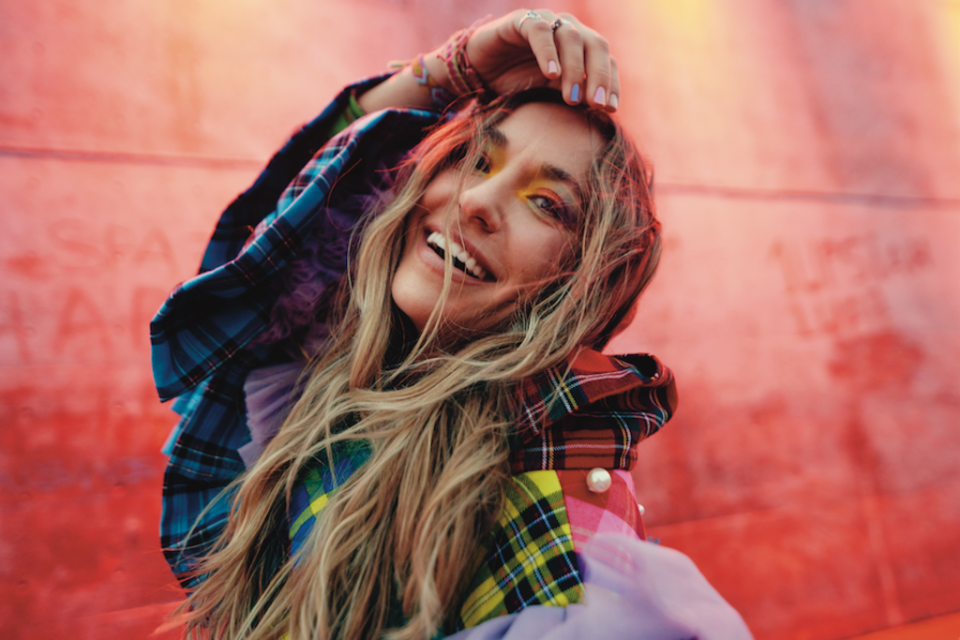
How did Mike Elizondo come into the picture to produce?
I had this man by the name of Dan McCarroll who was working with me in kind of a liaison/A&R kind of position, and Dan asked three other writers that I was working with, “Hey, based on these songs that are coming out of Lauren, what producer would you say she should work with?” And all four of them, without knowing that we talked to each one of them, said Mike Elizondo. So I went and took a meeting with him, and he’s just such a family guy, and he understands what it is to create from so much depth. I don’t know how to explain it, but he just allowed for space to create and the freedom that comes with creating.
I remember being in the studio and saying, “Hey, Mike, can we do this vocal part on this song ‘Ego’?” [The latter part of the song has layered vocals repeating the title word over and over, in a kind of choral cascade.] The only time he ever turned down an idea was if the chords didn’t work based on the structure of the song or something like that. But otherwise, he just let any idea that I had actually come to life. And that marriage, that collaborative spirit, was really profound and something that gave me new wings to fly with in the course of this record.
You collaborated with some really talented writers. You’ve got Lori McKena, who comes to Nashville to write a lot, and James Ingram, who you worked with on your last record. But just from scanning the credits, it seems like Natalie Hemby was your go-to collaborator for writing this album.
Oh my gosh, legend. We have 11 songs on this record together. [As of now, “Lauren Daigle” is only a 10-song album, with Hemby co-writing eight of those, but a significantly expanded edition is due this fall.] She is someone that didn’t just say, “Oh yeah, let’s write a couple songs together.” She genuinely took me under her wing and was like, “Lauren, what do you want to say?” And I felt like there was this season where I didn’t know what to say. I felt completely voiceless. With all of what was happening with COVID and the intensity at the time, I just felt like: Wow, I don’t know if I have what it takes to make another record, because I just genuinely don’t know what I can add right now… just kind of living in this doubt, if you will. She came along and she kept asking me the question: “What do you want to say? What do you want to say?” And when you have someone as prolific a writer as Natalie asking you every single day, “What do you wanna say,” eventually you find this place within you that does need to actually express something, and that can give something good into the world. She really shepherded me through that process. I always tell her that she’s the older sister I never had. When I say we treasure each other, that’s a lifelong friendship right there. She’s incredible.
Natalie seems like somebody who might sort of understand the different audiences that you have. Obviously she works in country, and she’s written in pop. And then she grew up with her mother working for Amy Grant, if memory serves…
Yeah, you’re correct.
And so she’s not unfamiliar with the Christian music world that has been so big a part of your audience, so you might have a shorthand where you don’t have to explain everything to her about who your audiences are or what you’re trying to do, necessarily.
Yeah. She is someone who absolutely understood the balance of, how do I give a product — if you will, if you want to go that route — that is of incredible quality? I wanted to seal these songs to the core. The way that she sculpts a melody is just incredible. There’s some people that, whe they go after a melody, will be, “Oh, here’s these four chords and this sounds good, and this will be emotive” and whatever. And then there’s other people that sit with a chord structure and the melody line, and they labor over every single note and they make sure… like, “This note actually is the best. And this note coming up is the exact one that is right just to hit you right in the gut.” They don’t waste anything in a song. Everything is very intentional.
So I wanted that type of intentionality and beauty to be expressed, but I also knew, OK, I don’t want the lyric to be compromised. I still want to give songs of hope and love and freedom to people, and I hope that this record gives the same amount of joy to people as I gained in making it. And she was someone who understood that mission; she very well understood the quality of the song cannot be forfeited in any sort of way. All the while, we have to have a lyric that can really connect to the audience that I’ve been with for years and years and years, as well as take even more people in. That was really important to me.
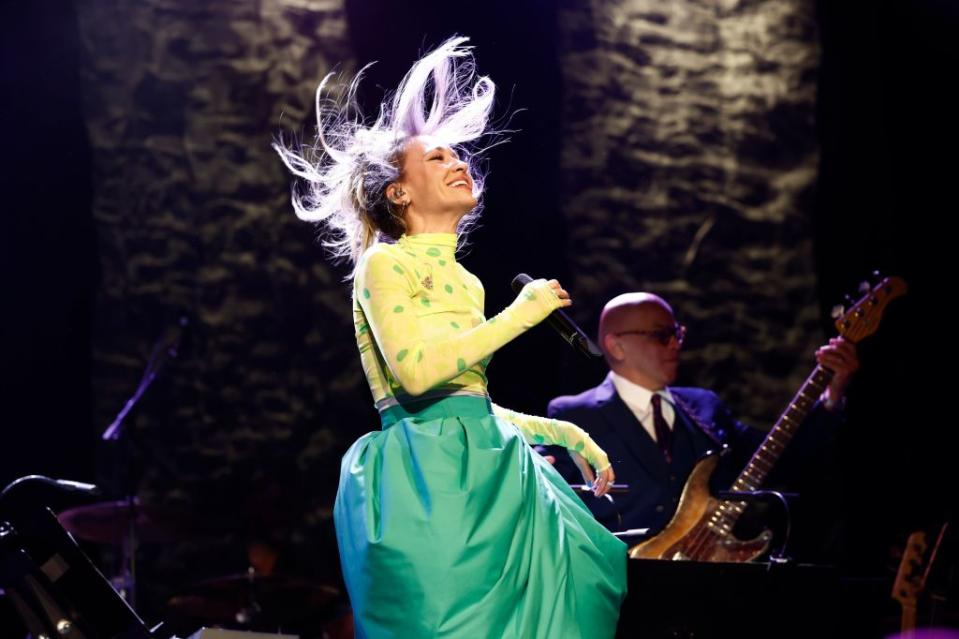
Some of the songs are self-explanatory, but there’s a regional angle that might bear explaining to “Saint Ferdinand.” And speaking of joy, you have Jon Batiste on the song, who kind of has a reputation for spreading some everywhere he goes.
I know. I absolutely adore Jon. He is one of my favorite musicians, just even as a person. He sent me a video when the record came out, just giving me love and blessings. He’s someone that is equally as joyful on stage as he is off, and that’s really important to me.
The song “Saint Ferdinand” is all about longing for a place that you once loved, but you had to move on. I left Louisiana, moved to Nashville, but Louisiana will always be the core of who I am. But I did pick up new things along the way. Sometimes, when you go through adversity and go through having to learn yourself in a new way, the challenge of a new city or a new place or whatever, it does strengthen you in the long run. It really does teach you and show you what you’re made of. And with this song, it’s all about that journey of feeling like, “Oh, I’m never gonna make it, I’m never gonna survive here.” And then before you know it, you’re falling in love because you allowed yourself to just go through the hurdle of missing home.
So on this track we have Natalie Hemby singing background vocals, who represents the Nashville side of my life now, and then Jon Batiste, who played melodica, and he represents home. It just naturally worked that way, too. We didn’t actually have a grandiose plan for that. It just happened. And then when we took a step back, we’re like, wait a second: Even who we got on this track told the story all the greater.
To talk about your voice for a minute… This is some of the best singing anybody’s going to hear on a record this year. And you were certainly known for the quality of your voice before, but it feels like there’s a leap on this record in how you’re using it. Maybe rasp is not the right term, but it feels just a little less pure than some other quote-unquote great voices, and it feels like there are subtleties to your phrasing that weren’t necessarily there before. Do you have any personal sense of something happening to make for a forward leap?
Oh my goodness. Well, first of all, what a high compliment. Just opening up from what you said about the vocals… It had been five years [since making the previous album]. I work with woman by the name of Jenny Muckala, who’s incredible; she works at Vanderbilt, and we don’t miss a beat. She is my go-to. Every show, every day, we warm up together, we practice new techniques together.
And she would always tell me why the female voice hits its prime when someone gets to their thirties. Because I was having some vocal trouble in my twenties, and she said, “Don’t worry. It’s because you’re trying to find your voice. This is all part of the process.” And she was so right. I remember getting to my thirties and being like, “What just happened? This is crazy!” And she told me, “The older you get, the huskier it’s gonna get, but it’s not gonna be the painful kind of husk, you know?” And so I leaned into that with her and just took that leap of faith of saying, “I wanna figure out how to work on my craft. I wanna figure out how to expand this thing. What all can I do?” We were diligent in that pursuit.
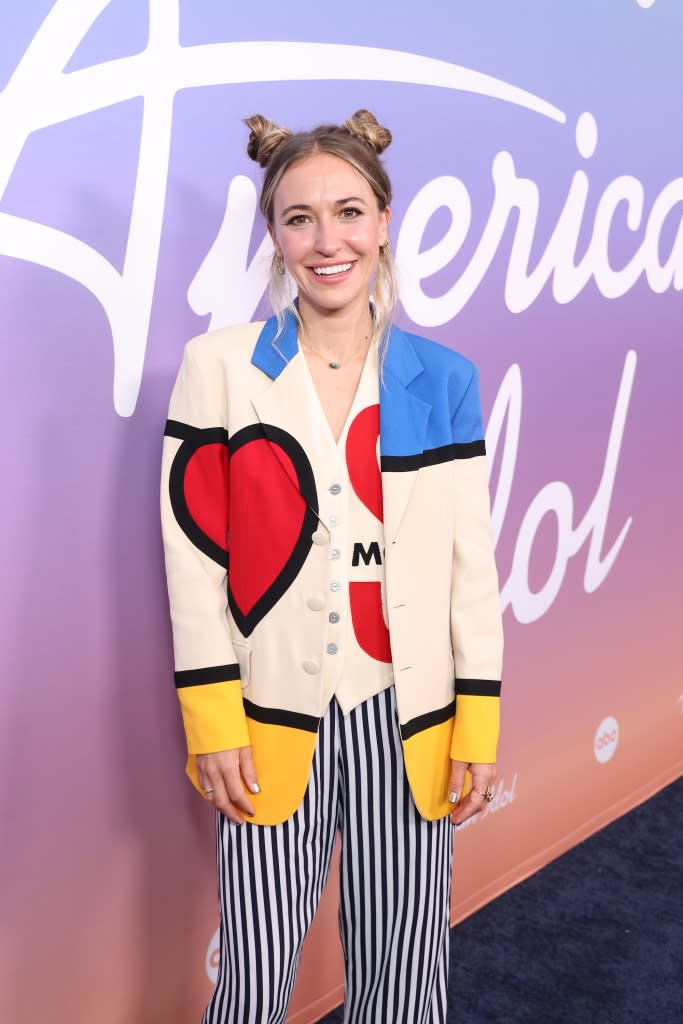
But I will say, a lot of it was… well, two things. One, going home during COVID, I would just sing and sing and sing. I would sing around the house, I’d sing in the shower, I would sing walking down the street. I was singing my way through that despair of the whole world just falling apart. And I remember there was something different coming out of me. I was like, “Wait a second. I didn’t know I could do that.” This is what it felt like when I was singing at 16 years old, not even knowing what the music industry was. This is how I used to sing around the house when I was a kid, with this type of freedom and exuberance — and technique. I remember thinking: “Wow, I remember being able to hit these notes when I was a teenager, but I don’t remember being able to hit these notes as an adult. What is happening?” And I really do feel like there was a reshaping that took place in that dormant season that I really needed. I needed a reset. I needed it spiritually, emotionally, mentally, whatever you want to say. My voice was able to express the things that I was experiencing in lockdown. And I knew I wanted to take those new places onto this record.
And Elizondo was a treasure to work with. Because I’m someone that could sit there and do it 50 times, right? I could be like, “OK, I’m gonna sing this, this, this, this, and let me just hit that note three more times. OK, wait, actually five more times, Mike. OK, wait…” And he was like, “No.” He was a one-and-done kind of guy. We would go in and the whole band would be on the floor at the same time: Mike’s playing bass, we’ve got drums, guitar, organ, keys, whatever, and then I’m in the vocal booth, and it’s one take and that’s that. There were a couple of takes where we did a few overdubs and things like that, but for the most part, he really liked everything to be consistent and tell the story between each instrumentalist and me as a vocalist. So, for that, I have to say hats off to Mike, because he found a way to take the pressure off me as well. And when that’s gone, then yeah, it’s an opportunity to soar.
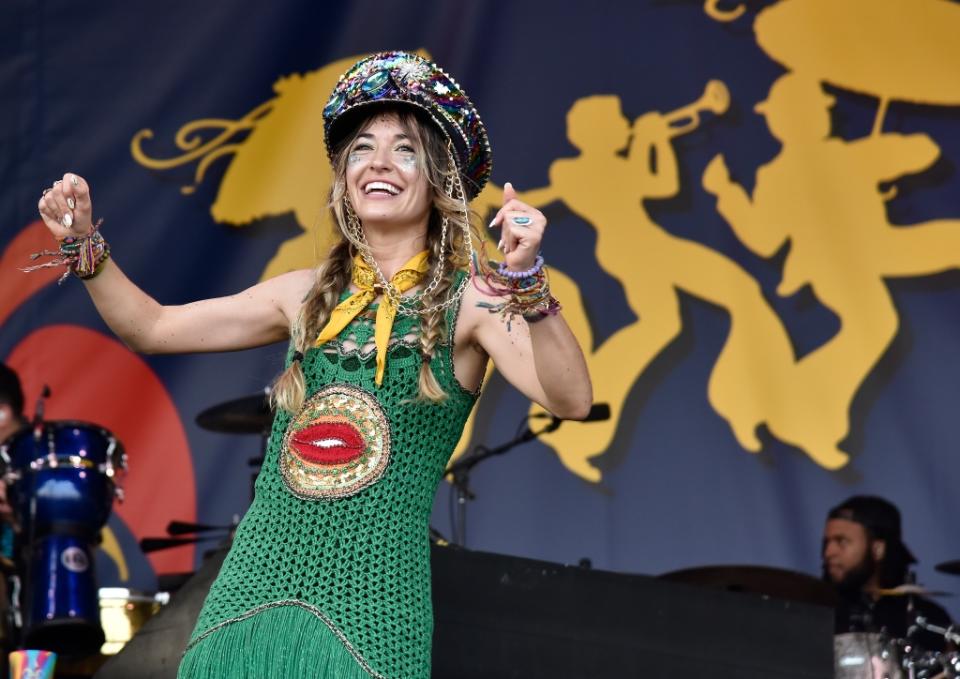
“Kaleidoscope Jesus” is one of the most fun songs on the album. Maybe that will surprise people, because you’re on a mainstream label now, Atlantic, and maybe there would be perceived pressure to have less overt religiosity, but then you go bigger for at least one track by putting Jesus in the title. But it’s for an uptempo song that it’s easy to imagine many people enjoying most on the album, whether Jesus is their thing or not. Is there anything you could say about that song?
That song I absolutely love, love, love. We were in New Orleans when we wrote that one — it was me, Mike, Jason and Natalie. We were like, let’s take a little New Orleans trip and get some writing done down there, because I wanted them to be able to see this world that allowed me to come so alive as a teenager and showed me so much about music. While we were down there, I was telling them about some of these encounters that I experienced during Mardi Gras, and I said, “You know, it’s really wild. Jesus shows up in places that you would never, ever imagine.” I know so many (Christian) people would say this, that and the other about Mardi Gras or even New Orleans just as a whole, but I was just telling them, “These are the places that I actually see Him. Like, I see Him in the trenches of humanity. I see Him meeting people in the worst of moments.” And we just talked about this kaleidoscope of imagery that he brings into the world.
And Natalie looked at me and she goes, “OK, well, this is amazing. I have a song that I want to write, and I have this title — I’ve literally saved it for you. I feel like no other artist could do this, because you’ve got the little hippie thing and the Jesus thing. I have a song called ‘Kaleidoscope Jesus’ — would you be interested?” And I was like, “That could not express more what my relationship with God even looks like, and to do it in a joyous way.” Those are the things I want to communicate on this record — that there is a lot of joy in having a relationship with Jesus. And so expressing that kind of sentiment and this lack-of-shame expression of God was so important to me, for people to see Him as this God of love and God of kindness and this God that will meet you in any place that you’re at.
That was the whole idea behind “Kaleidoscope Jesus.” I love it. And I was like, you know what’s really fun about this track? I said, “I feel like I’m on ‘That ‘70s Show’” — like in-between each scene, how they would jump in slow motion and do splits in the air and twirls and things like that. That is the imagery that I get every time I sing this song and every time I listen to it.
It kind of fits in, deliberately or not deliberately, with the album cover art, where your hair, or whatever is going on where your hair should be, is colorful enough to be kaleidoscopic.
Yep. That was very intentional. I’m glad you picked up on that.
Best of Variety
Tony Predictions: Best Musical -- Four Stand Poised to Give ‘Kimberly Akimbo’ Some Competition
This 'Fast and Furious' Arcade Cabinet Allows You to Step Behind the Wheel as Dom Toretto
Sign up for Variety’s Newsletter. For the latest news, follow us on Facebook, Twitter, and Instagram.

